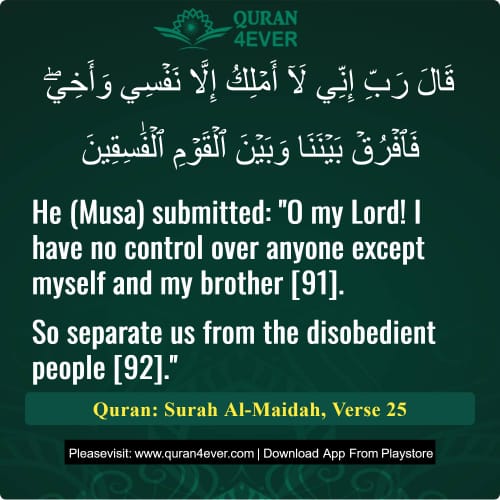
Transliteration:( Qaala Rabbi innee laaa amliku illaa nafsee wa akhee fafruq bainanaa wa bainal qawmil faasiqeen )
He (Musa) submitted: "O my Lord! I have no control over anyone except myself and my brother [91]. So separate us from the disobedient people [92]."
By the word ‘power’ here is meant control, authority, and power, and not formal ownership. No one owns his life or the Prophet’s. What Musa (on whom be peace) is saying is that he has authority only over himself and his brother, not over others. This verse reveals the extent of the disobedience and arrogance of the Israelites, so much so that even their Prophet felt despondent about their behavior.
From this verse, we learn several important lessons:
It is a good deed to keep away from evil-minded people, as Hazrat Musa (on whom be peace) prayed for separation from them.
The evil of the wrongdoers causes hardship for the pious. Due to these disobedient people, Hazrat Musa was forced to stay in Teeha, a place of discomfort and hardship.
Despite their sins, the sinful people receive blessings through the company of the pious. It was through the blessings of Hazrat Musa (on whom be peace) that the Israelites were provided with Manna and Quails at Teeha, enjoyed twelve fountains of water from the stone, and received clothes that did not wear out during their time in the wilderness.
The tafsir of Surah Maidah verse 25 by Ibn Kathir is unavailable here.
Please refer to Surah Maidah ayat 20 which provides the complete commentary from verse 20 through 26.
(5:25) Thereupon Moses said: ‘My Lord! I have control over none but my own self and my brother; so distinguish between us and the transgressing people.’
There is no commentary by Abul Maududi available for this verse.
[255]- Or "distinguish us" or "judge between us."

For a faster and smoother experience,
install our mobile app now.
Related Ayat(Verses)/Topics